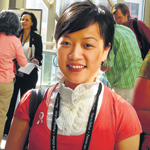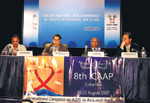|
|
|||||
|
AIDS – Danger nearer home Kumudini Hettiarachchi reports from the 16th International AIDS Conference in Toronto She has the new face of AIDS – and that face belongs to the young Asian woman. Nearly as old as the AIDS pandemic, which has kept the world in its vice-like grip for 25 years, the young Asian woman’s face was represented by 24-year-old Frika Chia Iskandar, an Indonesian living with HIV/AIDS.
Last Sunday as 24,000 scientists, advocates, political leaders and health workers from 170 countries gathered for a week-long summit here in Toronto to take stock and move forward in the battle against the most devastating disease humankind has ever faced, Frika brought her campaign against HIV-related stigma to the world stage. Among the celebrities attending the 16th International AIDS Conference were former US President Bill Clinton, Microsoft billionaire Bill Gates and his wife Melinda and white-haired and bearded actor and activist Richard Gere. As all indicators pointed to a shift in the HIV/AIDS epidemic from Africa to Asia, Frika called for the greater involvement of people living with HIV/AIDS in not only educating people on this disease, but also in prevention and care and support programmes. “Nothing much has changed with regard to stigma and discrimination,” she said, urging the world to “learn how to live with this,” while attempting to change people’s attitudes towards those having HIV/AIDS. Taking on the theme of the conference ‘Time to deliver,’ Frika stressed that “the world has to move beyond words, beyond commitment, beyond talk.” “We have to deliver, otherwise we are going
to lose with AIDS,” she appealed. Microbicides are gels or creams that women can use to block infection, and are the first preventive tools that would be intended specifically for women’s use. Stressing that no matter where a woman lives, who she is or what she does – a woman should never need her partner’s permission to save her own life, Bill Gates said, “We need tools that will allow women to protect themselves. This is true whether the woman is a faithful married mother of small children or a sex worker trying to scrape out a living in a slum.” The discovery of an effective microbicide or oral prevention drug to reduce HIV transmission could be the next big breakthrough in the fight against AIDS, he said, however, explaining that “as we discover preventive tools that women can use without a man’s cooperation, we are not excusing men from their obligations to be sexually responsible and to protect their partners. We are just reducing the consequences to women if they don’t.” Adding her voice to his passionate appeal, Melinda
Gates called for more aggressive advocacy and stronger leadership
to break the “cruel” stigma associated with HIV/AIDS,
which has made the disease “much harder to fight”. “The image of stigma was burned into my mind during a visit Bill and I made last December to an AIDS hospice in South India. The patients in the hospice were separated by gender. The long narrow trailer of the male ward was filled with families and flowers. Children came to spend precious last minutes with their fathers,” she said, adding that across a courtyard was a very different scene. The female ward was a lonely, desolate place. “There were no visitors, just women wasting away from AIDS. Some of them had managed to get themselves to the hospice, others had been abandoned there by a relative, who no longer wanted anything to do with them. There was no love, no warmth, no comfort. Just wives and mothers left alone to die.” This is the indictment on Asia. With 8.3 million adults and children living with HIV/AIDS in the region, are we in denial? Are we closing not only our eyes and ears, but also our hearts to the danger signals that HIV/AIDS is sending us until an explosion in the form of an epidemic rocks Asia? By the time we open our eyes, ears and hearts it may be too late, unless we act right now.
| |||||
Copyright © 2006 Wijeya Newspapers
Ltd. All rights reserved. |

